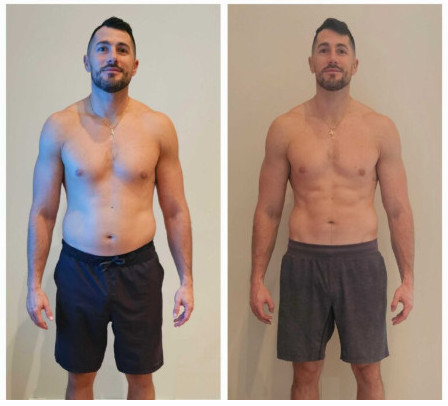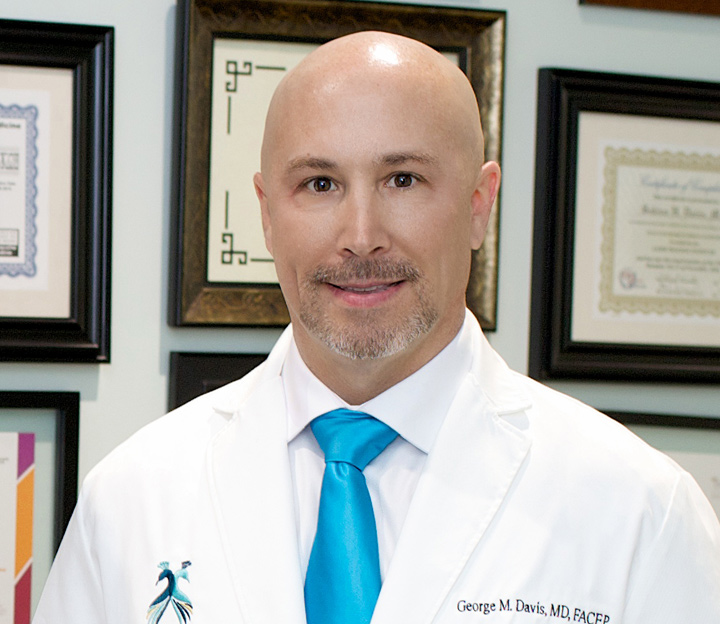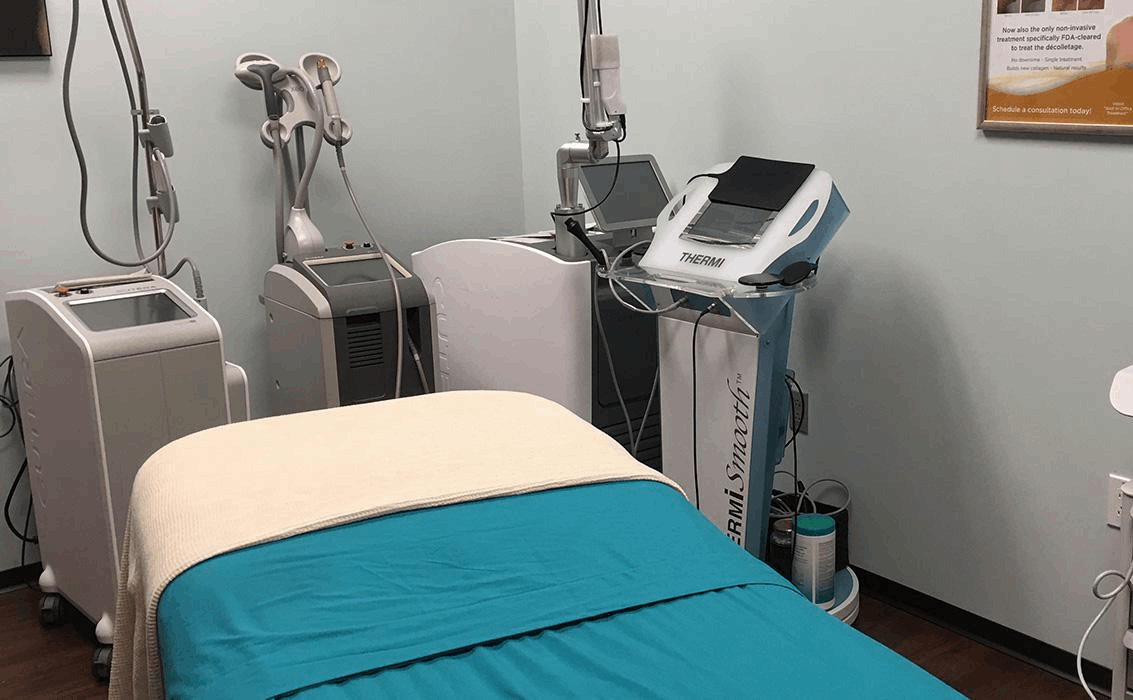Introduction
Navigating the transition into menopause can feel overwhelming for many women. It often brings uncomfortable symptoms that disrupt daily life, leaving you feeling out of sorts. Hormone Replacement Therapy (HRT) shines as a beacon of hope, offering relief and the chance to reclaim your sense of well-being.
However, deciding when to start HRT isn’t always straightforward. It’s essential to understand your personal health, evaluate your symptoms, and consult with healthcare professionals who can guide you. What critical factors should you consider before embarking on this transformative journey?
We understand that this is a significant decision, and it’s okay to feel uncertain. Together, we can explore the options available to you, ensuring you feel supported every step of the way.
Understand Hormone Replacement Therapy (HRT)
Menopause can bring about a range of challenging symptoms, and we understand how overwhelming this time can be. That’s where Hormone Replacement Therapy (HRT) comes in. At Woodlands Wellness & Cosmetic Center, we offer expert hormone health solutions tailored just for you, ensuring that your journey towards optimal wellness is personalized and compassionate.
HRT typically involves administering estrogen, progesterone, or a combination of both, depending on your unique health needs. Understanding the different types of HRT – such as systemic, which affects the entire body, and local, which targets specific areas – is crucial for anyone considering this therapy.
Imagine being able to significantly reduce those pesky hot flashes, night sweats, and mood swings. HRT can enhance your overall well-being during this transitional phase, allowing you to feel more like yourself again.
Together, we can navigate this journey. If you’re ready to explore when can you start HRT and how personalized hormone replacement therapy can help you, reach out to us today. Your wellness is our priority, and we’re here to support you every step of the way.
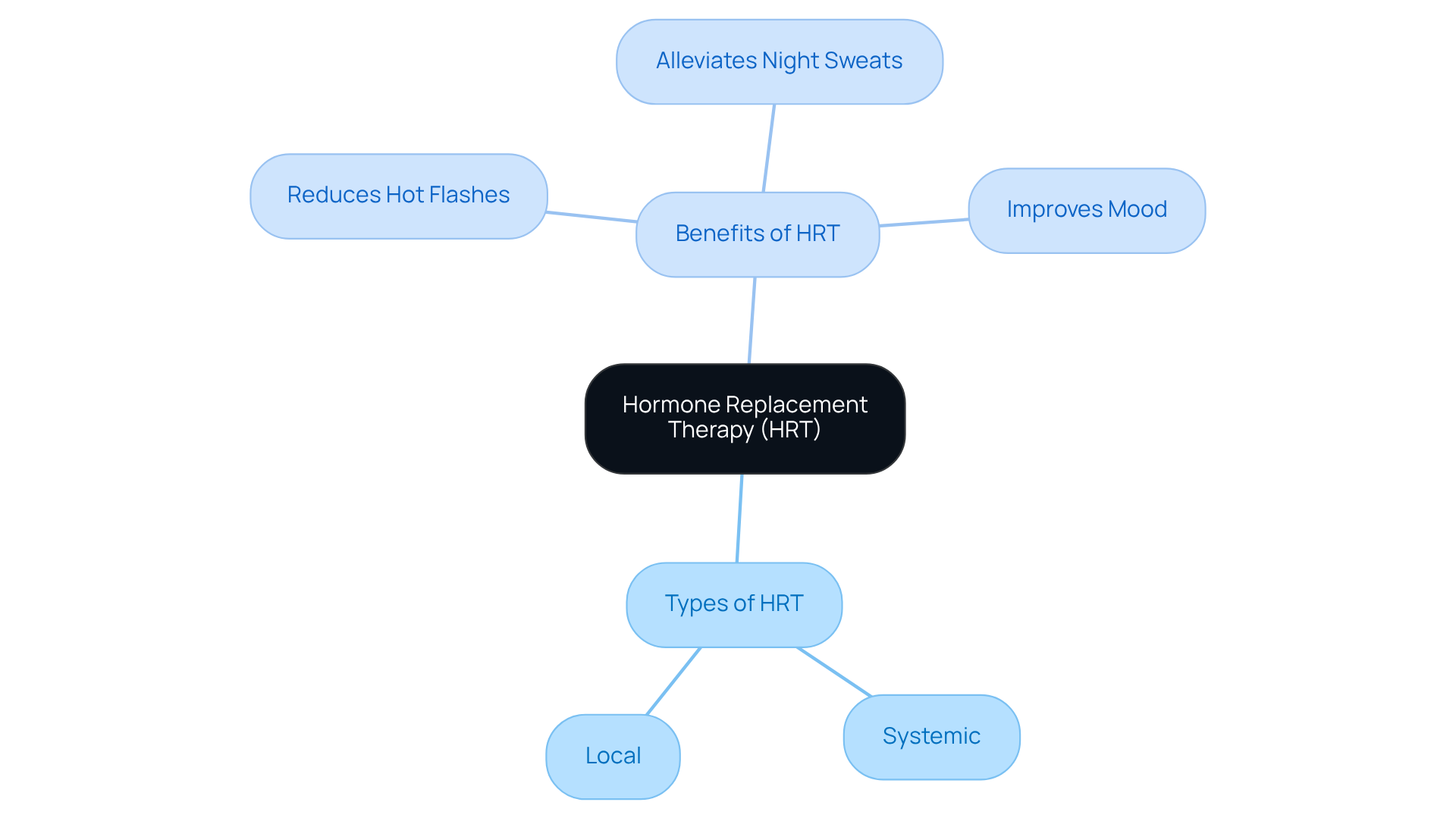
Identify Key Factors for Starting HRT
Before embarking on Hormone Replacement Therapy (HRT), it’s essential to consider several key factors that can significantly impact your journey:
-
Age: Typically, individuals start HRT between 45 and 55. However, everyone’s situation is unique, and this timeline can vary.
-
Severity of Symptoms: Take a moment to evaluate how intense your menopausal symptoms are. Did you know that studies show 80% to 90% of women experience menopausal issues? Among them, about 25% describe their symptoms as severe. This makes HRT a potentially beneficial option for many.
-
Medical History: It’s crucial to discuss any personal or family history of conditions like breast cancer, heart disease, or blood clots with your healthcare provider. This information is vital for tailoring a safe and effective treatment plan that suits your needs.
-
Lifestyle Factors: Reflect on how your lifestyle choices, including diet and exercise, may influence your hormonal health and the overall effectiveness of HRT. Engaging in regular physical activity, such as swimming, can offer significant health benefits and support hormonal balance. Notably, 60% to 70% of women experience weight gain as a sign of menopause, highlighting the importance of lifestyle decisions.
-
Expert recommendations emphasize that when can you start HRT within 10 years of menopause onset can optimize benefits while minimizing risks. As Dr. Sherry Ross states, “By the FDA removing the misleading ‘black box’ warning for hormone therapy to treat menopausal women, this supports all the benefits that hormone therapy affords women for healthy aging and longevity.” Consulting with a knowledgeable healthcare provider can help you navigate these considerations effectively.
Together, we can explore these factors and find the best path forward for your wellness journey.
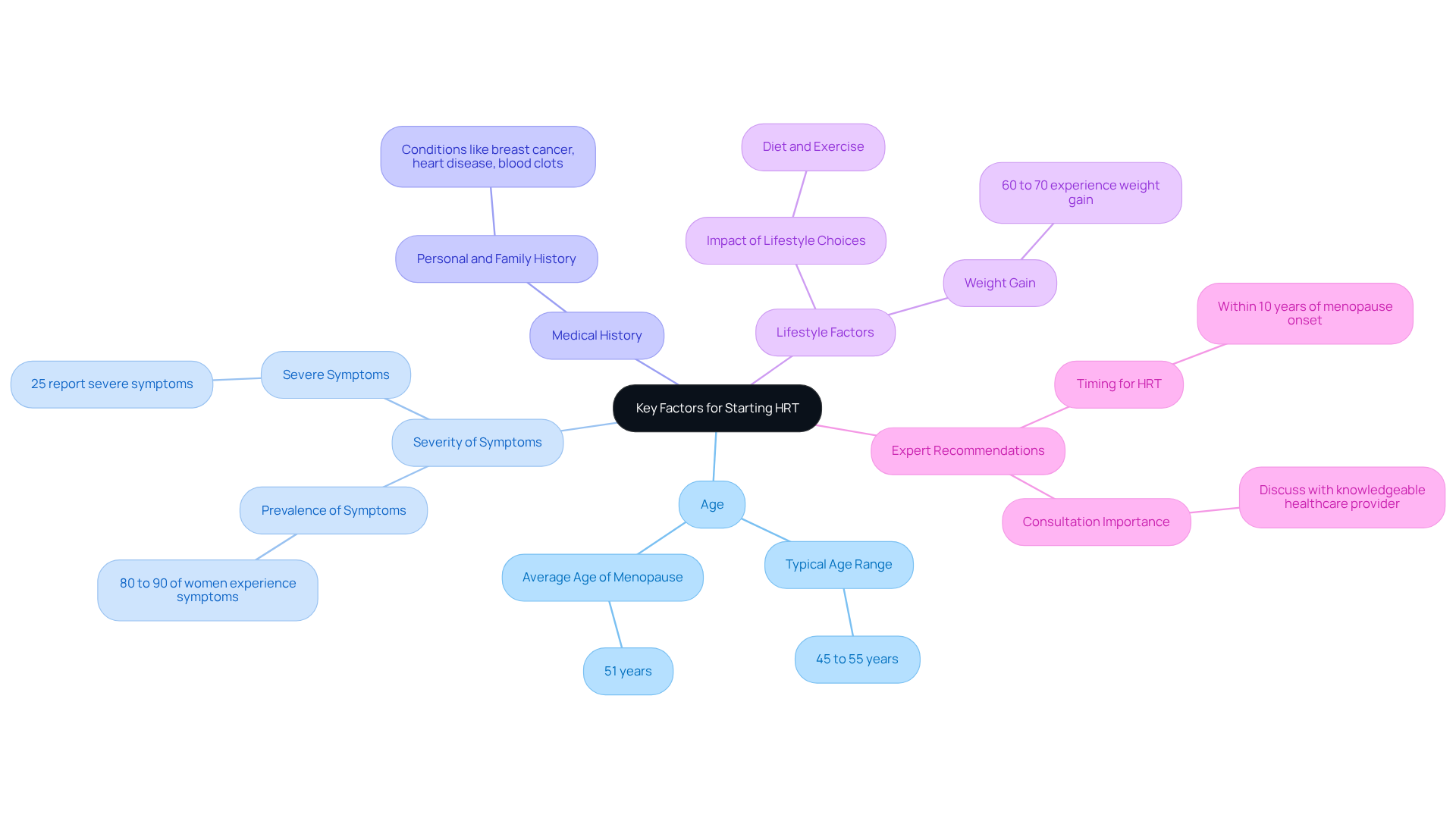
Evaluate Personal Health and Symptoms
To truly understand your health and the challenges you face, it’s important to keep a record of your experiences. This simple practice can empower you on your wellness journey.
Frequency and Intensity of Symptoms: How often do you find yourself experiencing symptoms like hot flashes, mood swings, or sleep disturbances? Keeping track of these occurrences can provide valuable insights into your health.
Impact on Daily Life: Reflect on how these symptoms affect your work, relationships, and overall quality of life. Recognizing their impact can help you articulate your needs better.
Physical Health: Consider any existing health conditions or medications that may influence your decision regarding when can you start HRT. This information will be invaluable during your consultations with healthcare providers when can you start HRT.
By taking these steps, you’re not just documenting your experiences; you’re preparing yourself for informed discussions about your health. Remember, we understand that this journey can be challenging, but together we can navigate it.
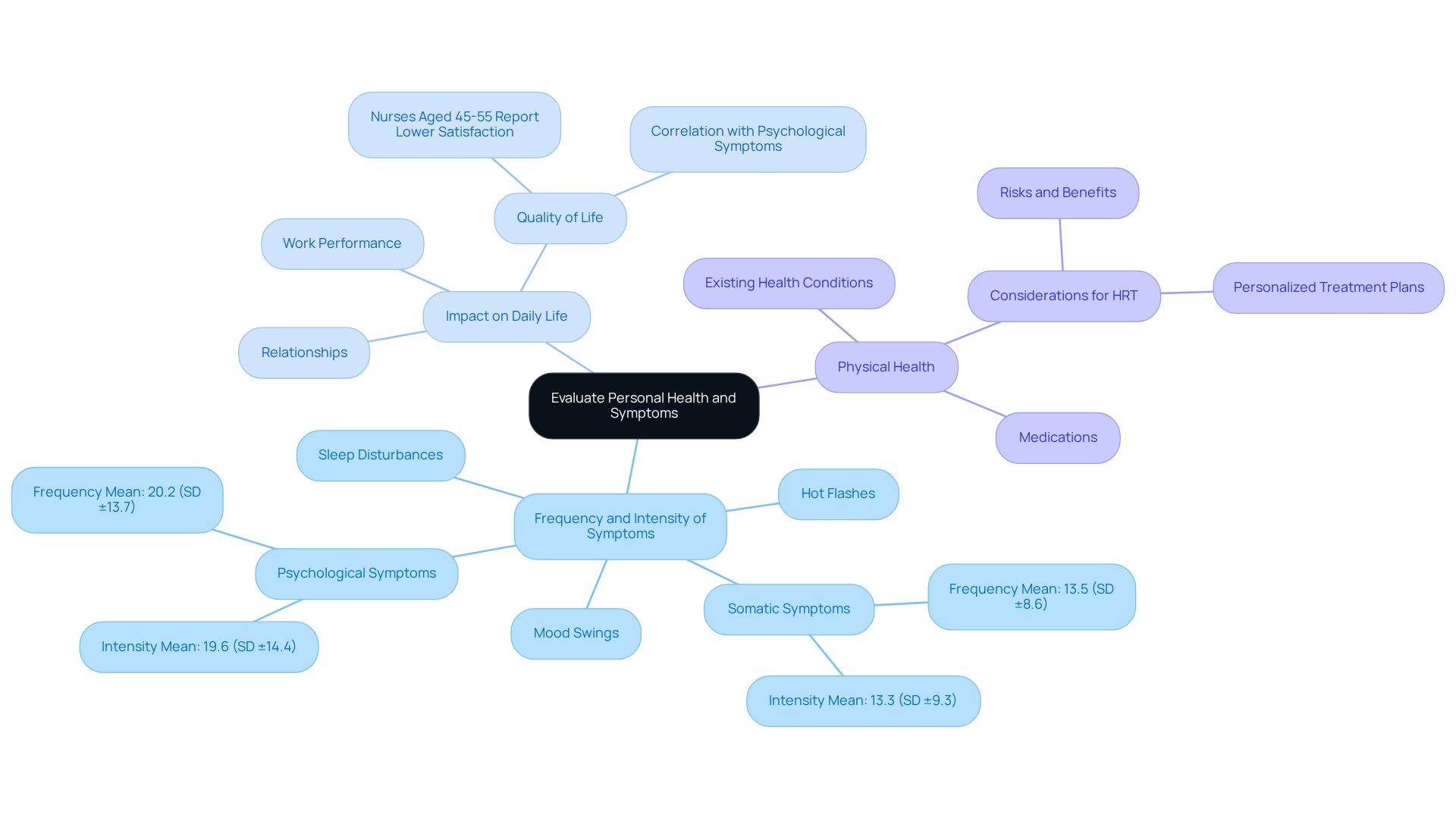
Consult Healthcare Providers for Guidance
Starting your journey with hormone replacement therapy (HRT) at Woodlands Wellness & Cosmetic Center is an empowering step towards better health. To get started, schedule an appointment with a healthcare provider who specializes in menopause and hormone therapy. Our dedicated team is here to support you with personalized wellness solutions that truly cater to your needs.
During your consultation, it’s important to focus on a few key areas:
- Discuss Symptoms: Take the time to clearly articulate your symptoms and how they impact your daily life. This open dialogue helps your provider understand your unique needs and tailor their recommendations just for you.
- Review Medical History: Share a detailed overview of your medical history, including any family history of hormone-related conditions. This information is vital for assessing when can you start HRT.
- Ask Questions: Come prepared with a list of questions about the benefits, risks, and various types of HRT available. Common inquiries might include:
- What are the potential benefits of starting HRT?
- Are there specific risks associated with HRT that I should be aware of when considering when can you start HRT?
- What kinds of HRT do you suggest for my issues, and when can you start HRT?
- When can you start HRT, and how will it impact my overall health?
- What monitoring will be necessary when can you start HRT?
Engaging in this dialogue not only empowers you but also fosters a collaborative relationship with your healthcare provider. At Woodlands Wellness & Cosmetic Center, we emphasize the importance of open discussions about symptoms and treatment options for effective care. Real-life examples show that women who actively participate in these conversations often feel more satisfied with their treatment outcomes. By preparing adequately for your consultation, you can make informed decisions that align with your health goals. Together, we can navigate this journey towards wellness.
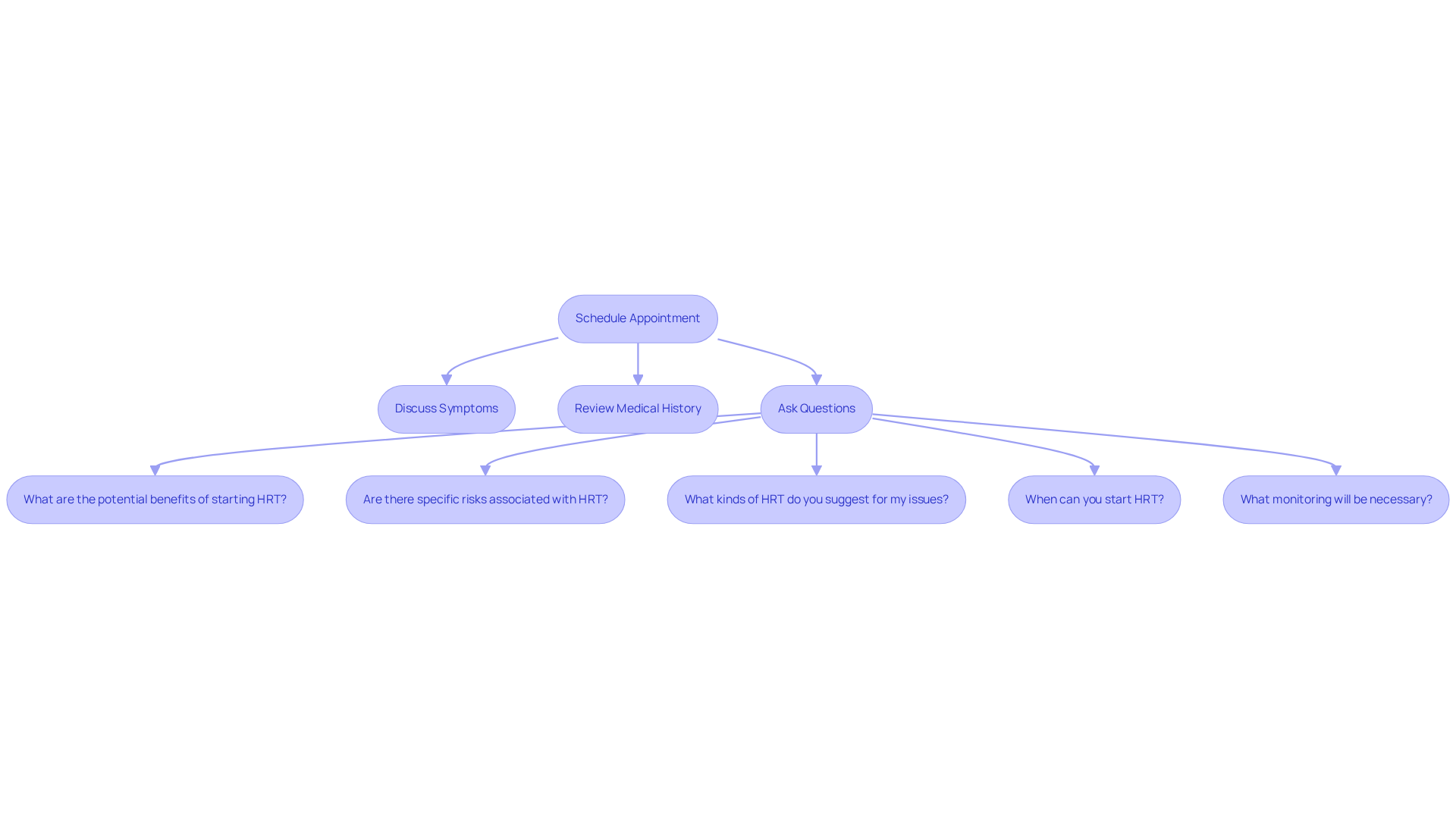
Take Steps to Begin HRT
Once you and your healthcare provider have determined that hormone replacement therapy (HRT) is right for you, it’s important to follow these essential steps:
-
Choose a Treatment Plan: Let’s start with a thorough discussion about the different types of HRT available. Whether it’s systemic or local options, together, you can select a plan that’s tailored to your specific needs and health profile.
-
Start with a Low Dose: It’s wise to initiate treatment with the lowest effective dose. This approach not only helps minimize potential side effects but also allows your body to adjust to the hormones gradually.
-
Schedule Follow-Up Appointments: Regular follow-ups with your healthcare provider are crucial. These appointments provide an opportunity to monitor your response to HRT and make any necessary adjustments to optimize your treatment.
-
Monitor Symptoms: Keeping a detailed record of any changes in your symptoms – like mood swings, night sweats, and hot flashes – can be incredibly helpful. Sharing these observations during follow-up visits ensures that your treatment remains effective and safe.
-
Consider Real-World Examples: Many individuals have successfully started HRT with low doses, experiencing significant improvements in their quality of life. For instance, studies show that only 4.7% of postmenopausal women used hormone therapy in 2020, down from 26.9% in 1999. This indicates a need for more women to explore this option. Women who began with lower doses often reported manageable side effects and positive symptom relief, reinforcing the importance of individualized treatment plans.
Healthcare providers emphasize that the question of when can you start HRT should be based on a collaborative conversation, weighing the benefits against potential risks. As Dr. Steven Fleischman notes, “Their use should be based on an individualized conversation between patients and their clinicians.” This shared decision-making process is vital for achieving the best outcomes in your HRT journey. Together, we can navigate this path to better health.
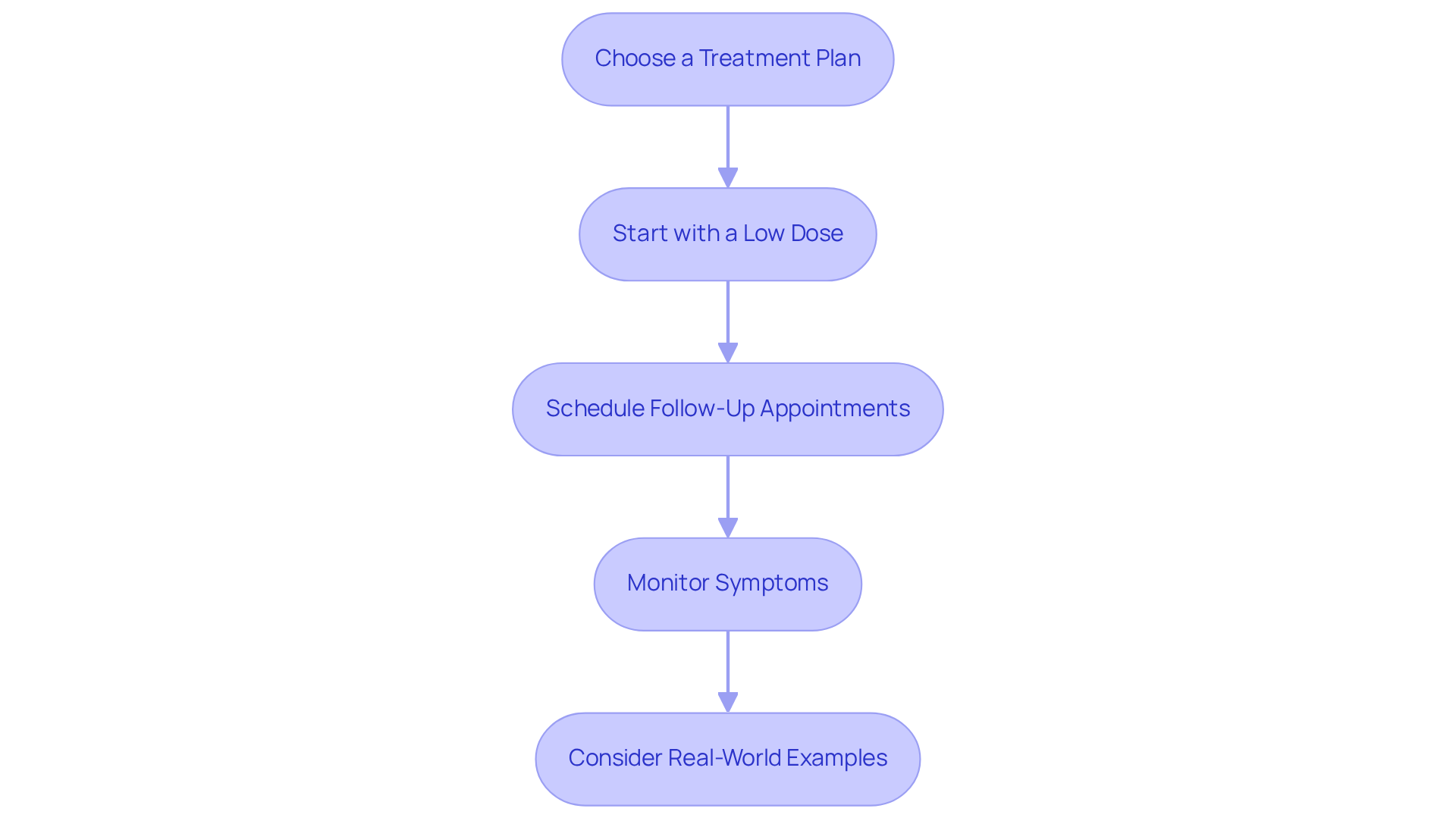
Conclusion
Navigating the journey of Hormone Replacement Therapy (HRT) can truly be a transformative experience for middle-aged women facing the challenges of menopause. We understand that this significant life transition can feel overwhelming, and that’s why understanding the timing and factors involved in starting HRT is essential for optimizing health and well-being. By exploring the various types of HRT, evaluating personal health, and consulting with healthcare providers, women can make informed decisions that cater to their unique needs.
Key considerations include:
- Age
- Severity of symptoms
- Medical history
- Lifestyle choices
These factors play a vital role in determining when to start HRT. Engaging in open discussions with healthcare professionals ensures that women receive tailored recommendations that align with their health goals. Furthermore, taking proactive steps – like documenting symptoms and understanding treatment options – can empower women to take control of their wellness journey.
Ultimately, the decision to start HRT should be a collaborative process that prioritizes individual health and quality of life. By embracing this approach, middle-aged women can significantly alleviate menopausal symptoms and enhance their overall well-being. Remember, support is available, and taking that first step towards HRT can lead to a brighter, healthier future. Together, we can navigate this journey and find the best path forward.
Frequently Asked Questions
What is Hormone Replacement Therapy (HRT)?
HRT is a treatment that involves administering estrogen, progesterone, or a combination of both to alleviate menopausal symptoms and enhance overall well-being.
What are the types of HRT?
The two main types of HRT are systemic, which affects the entire body, and local, which targets specific areas.
What symptoms can HRT help reduce?
HRT can significantly reduce symptoms such as hot flashes, night sweats, and mood swings during menopause.
At what age do individuals typically start HRT?
Individuals usually start HRT between the ages of 45 and 55, but this can vary based on individual circumstances.
How severe do menopausal symptoms need to be to consider HRT?
HRT may be beneficial for individuals experiencing severe menopausal symptoms, as studies show that 80% to 90% of women experience menopausal issues, with about 25% describing their symptoms as severe.
Why is medical history important before starting HRT?
Discussing personal or family medical history, including conditions like breast cancer, heart disease, or blood clots, is crucial for tailoring a safe and effective HRT treatment plan.
How do lifestyle factors influence HRT effectiveness?
Lifestyle choices, such as diet and exercise, can impact hormonal health and the overall effectiveness of HRT. Regular physical activity can provide significant health benefits and support hormonal balance.
When is the best time to start HRT for optimal benefits?
It is recommended to start HRT within 10 years of menopause onset to optimize benefits while minimizing risks.
What recent change has been made regarding HRT warnings?
The FDA has removed the misleading ‘black box’ warning for hormone therapy to treat menopausal women, supporting the benefits of hormone therapy for healthy aging and longevity.
How can individuals explore starting HRT?
Individuals are encouraged to consult with a knowledgeable healthcare provider to discuss their options and navigate the considerations for starting HRT effectively.



